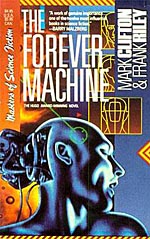
![]() Naomi_uk72
Naomi_uk72
2/27/2020
![]()
Initially published between August and November 1954 as a four-part serial in Astounding Science Fiction magazine, They'd Rather Be Right explores the concept of a machine with the power to grant eternal youth and telepathic powers, but only to those subjects who are willing to let go of their ingrained prejudices and beliefs.
The novel itself is a sequel to the earlier stories Crazy Joey and Hide! Hide! Witch!, the first of which introduces the telepathic protagonist Joe "Joey" Carter as a young child just beginning to understand his psychic powers, while the second covers the initial creation of the cybernetic brain, "Bossy", and the way her creation leads to an almost literal witch hunt.
Picking up more-or-less immediately after the second of these stories, the novel follows Joe Carter and the two professors most involved in Bossy's creation as they attempt to rebuild the machine in secret. For the two professors, Bossy is a tool for optimising the way people think, though they're unaware that Joey has other hopes for the machine's powers.
When Bossy's first test subject inadvertently finds herself in the public eye, Joe and his colleagues call upon the help of wealthy industrialist, Howard Kennedy, to bring the machine out of hiding and to get the public on their side before the government can confiscate it from them.
Exactly how this book managed to win the Hugo Award for Best Novel is something of a mystery. It is regularly described as the worst book to ever win the award, and there are a number of theories about how it got there in the first place, though nothing concrete. One suggestion is that it benefited from a block vote by Scientologists, a plausible explanation if you consider the way in which the narrative identifies psychology as a self-serving cult. Another block-voting theory suggests that fans of Astounding nominated it en masse as a kickback against the previous winner being from the pages of Galaxy, a publication they didn't consider to be a true Sci-Fi magazine. However, the most likely explanation is that most of the voters cast their ballots for the book without reading it, relying on author Mark Clifton's popularity as a short story writer to carry the result. Whatever the truth it's plain to see that controversial outcomes have been a part of Hugo history for almost as long as the awards themselves.
In terms of the writing itself this is a fairly adequate novel. There's nothing particularly outstanding about the narrative or the way in which the characters are presented, to the point that none of the protagonists really stand out as anything special. Likewise, the themes explored aren't exactly groundbreaking, and there are a lot of loose ends by the close of the story that it simply feels unfinished.
It has to be said that there isn't anything inherently bad about this book, but there really isn't anything to commend it either. When you stack it up against the wide array of other books to win the Hugo over the years it definitely doesn't stand up well. In fact, it's hard to imagine a book like this even finding a publisher today. There's a reason it's barely been in print for the last sixty-five years.
At best, it scores two-and-a-half stars out of five, and if I'm being honest that's a kindness. If you're really determined to read every Hugo winning novel ever then go for it, but don't expect anything too spectacular from this one.